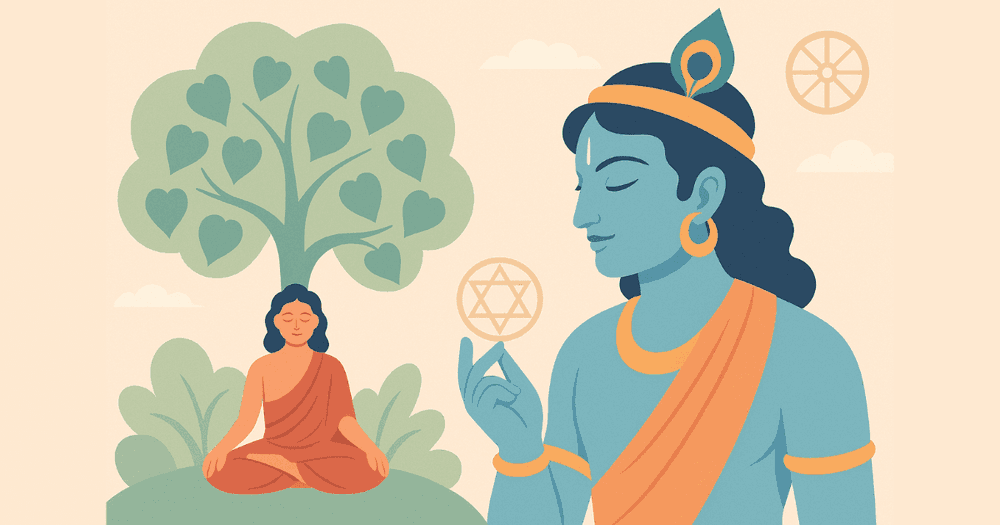How to Stop Worrying What Others Think: The Gita, Vedas, Ramayana, Mahabharata on Inner Peace
By Pt. Sanjeev Sharma
Stories that Teach Equanimity, Self-Knowledge and Freedom from Social Anxiety

Table of Contents
Most people spend much of their lives preoccupied with "what will others think" and "how am I regarded." Students, householders, leaders, seekers-no class is immune. In the Gita, Krishna sets Arjuna at the crossroads: “Should I choose my own path or bend to the will of friends, teachers and relatives?” This dilemma haunted Prahlada as a child, Sita in the Ramayana and countless characters in Mahabharata as they faced society’s gaze.
Is It Right to Base Your Worth on Others’ Opinions?
The Vedas and Upanishads
[translate:Ishopanishad] states, “Ten tyaktena bhunjitha”-renunciation of image, attachment and wish is the root of peace. Liberation is found within, not in the mirror of the world.
See the story of Satyakama Jabala-society doubted his birth, name and status but he truthfully claimed only his mother’s name. His guru, Gautama, recognized the truth and imparted full spiritual wisdom.
Lesson: Beyond outward image or public status, self-acceptance and inner honesty matter most.
Ramayana: Sita, Hanuman, Bharata and Dasharatha
Sita’s life was full of accusation and social blame. She stood trial, endured fire and held only to truth, dharma and unyielding inner strength.
Hanuman always placed his ‘swadharma’ first. He performed the burning of Lanka, accepted Vibhishana and served Rama regardless of external relations or society’s judgment.
Bharata, despite being given a throne by his mother’s intrigue, set aside the fear of public perception and performed the coronation of Rama’s sandals instead.
Dasharatha desired social acceptance but lost everything-his confusion over “what will people say” and trying to please his wife ended in heartbreak.
Lesson: Chasing others’ approval sometimes means losing yourself.
Mahabharata: Identity, Image and Society
Karna spent his life trying to erase the label ‘sutaputra’ and to prove his worth to society, even sacrificing personal relationships in battle.
Yudhishthira often sacrificed his own happiness for his role as preserver of dharma and social peace.
Draupadi, in her lowest moment of public shame, called only to Krishna and society’s judgment was replaced with divine strength.
Table: Epics and the Fear of Opinion
| Epic / Character | Crisis | What They Chose | Lesson Learned |
|---|---|---|---|
| Upanishad | Satyakama Jabala | Truth, honesty | Self-acceptance, fearlessness |
| Ramayana | Sita | Inner strength, endurance | Faith and trust over society |
| Ramayana | Hanuman | Duty, devotion | Faith and trust over society |
| Mahabharata | Karna | Identity, stigma | Loyalty and valor over image |
| Mahabharata | Draupadi | Public shame | Faith and trust over society |
How the Gita Breaks the Cycle of Overthinking
- Stay Aligned to Swadharma: Know yourself and your rightful duty over shifting expectations.
- Work Without Obsessing Over Results: Praise is external, effort is internal.
- Train the Mind: Ground thought with meditation, prayer, story and practice.
- Seek Equanimity: Society’s opinions can change in a day; wisdom and balance last.
- Pierce Urban Myth: Wish the world well but seek liberation from the snare of impressions.
- Release Ego: Do not be caught in your own self-image; live easily for yourself, not others’ applause.
Stories Offer the Most Practical Wisdom
Legends teach us that when you feel captive to reputation, slander or comparison, breathe and return to Gita and the old stories.
Ask deeply-will the effect last a year from now?
Did Krishna, Rama, Hanuman or Sita ever let reputation trump truth? Seek lasting pillars inside, not in external games.
FAQs (From Stories, Ethics and Modern Psychology)
1. Is public image binding for human beings?
Partially. Society matters but self-knowledge and honest living always come first.
2. Is ‘overthinking’ genuinely a modern problem?
No. Ramayana, Mahabharata and Upanishads all detail this inner-outer struggle.
3. How do I escape the fear of society?
Contemplate, practice and learn from stories; small victories, honest talk and emotional acceptance all help.
4. Does worrying about image make relationships or careers stronger?
Perhaps briefly. But true love, work and friendship last only if you are honest within.
5. Which Gita verse teaches rising above social opinion?
"Sama shatrau cha mitre cha... santushtah yena kenachit..." - equanimity, satisfaction and social independence.
The Living Thread of the Gita, Puranas and Epics
True peace does not come from outward regard but springs from within. Opinions and concerns will always come. The soul secure in truth, duty and honest effort remains unmoved by slander or flattery-finding real freedom, depth and joy inside.
Get your accurate Kundali
Generate KundaliDid you like it?
Author

Pt. Sanjeev Sharma (50)
Experience: 15
Consults About: Family Matters, Spirituality
Clients In: DL, MH, UP
Share this article with friends and family